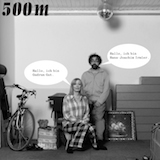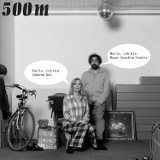GUT UND IRMLER
_300.jpg)
The notion that Jochen Irmler and Gudrun Gut would one day merge the best of their two worlds was never quite to be expected. We hear Irmler's meandering, wistfully psychedelic organ sound, seeming to come from a different era. And we hear Gut's reverb-laden, whispering, breathy voice as she sings: "Sonnenbrille auf, wir gehen zu den Sternen / Sonnenbrille ab, wir tauchen tief hinein" (in the track "Auf & Ab").
Both approaches to music – the Krautrock-informed, epic willingness to explore on the part of Irmler; the structured and technoid Berliner discipline (which is practically a contradiction in itself) of Gut - are conjoined in glistening beauty on this collaborative album "500m", recorded at the Faust studio in Scheer in Autumn of 2013.
Analog and digital, town and country, past and present, elliptical melodies and linear beats - all complementing each other in a most cosmic manner! Gudrun Gut: "I had asked Jochen if perhaps we might like to work together. Both with Faust and his solo works, his approach is more improvisational. Improv is not exactly my thing; I don't work that way. I tend to construct something, then refine what's been recorded using the computer, until everything fits. But Jochen's organ playing has always fascinated me. He sits down at the organ and plays and plays, while I tend to dissect everything, then deconstruct and collage things."
Jochen Irmler: "A few years ago, when she played at our Klangbad Festival, I asked Gudrun if she might iike to make an album with me. For more than a decade, I have been following a concept that merges electronics and percussion - and most collaborations were solely among men. I wanted to break with that and asked Gudrun if she would like to complement my organ improvisations. And in her case, she doesn't play the drums, but programs the drums."
In fact, the clash of these two schools is especially constructive. Some pieces consist only of snippets and cut-ups of Irmler's organ, which are held together by Gut's programming and her voice. In other tracks, the organ plays through. The division of labor is interesting: During the initial two sessions in Scheer, Jochen Irmler was at the helm, while Gut contributed rudimentary grammar - simplistic backing beats, rough architectures, moods.
Back at her own studio in Berlin, Gut refined and deconstructed the sometimes up to thirty minute long original improvisations. The roles were essentially exchanged, with Irmler listening from a distance via file sharing. When listening to the album with that in mind, one can guess how much editing is behind these tracks.
If two such esteemed musicians as Jochen Irmler and Gudrun Gut not only declare their mutual trust, but also live it out within the framework of a co- production, as described with the example of their working method, the result is per se relevant, because it is a historical document. That it also sounds so incredibly inspired, of course, is a result of these coordinates, but by no meansself-evident. Why might it be so? Where does the magic of these recordings come from? Gudrun Gut: "I was constantly dizzy during production in Scheer. I asked Jochen why this could be. He replied, 'We are 500 meters above sea level here'." That immediately made sense to me, and at the same time explains the album title.
Max Dax, Warsaw 2014
Read the info sheet (PDF) in German
Download the info sheet (PDF): English
Download press kit here


_200.jpg)
_200.jpg)
_200.jpg)
_200.jpg)